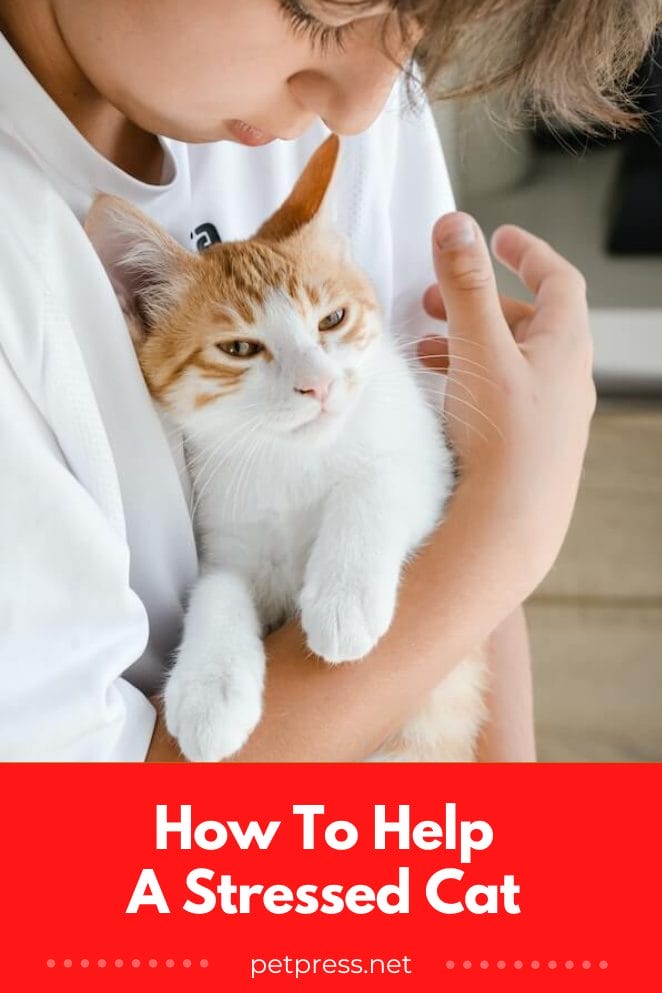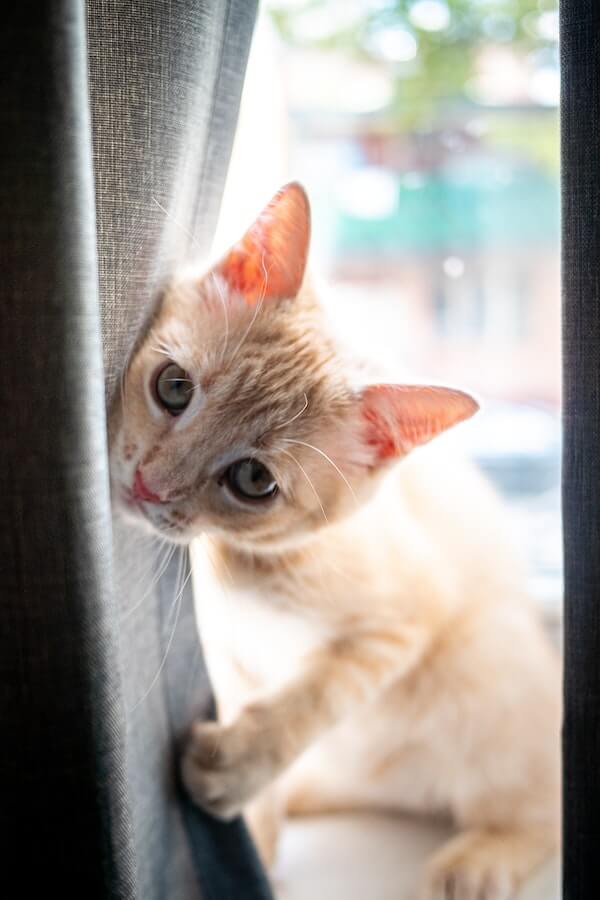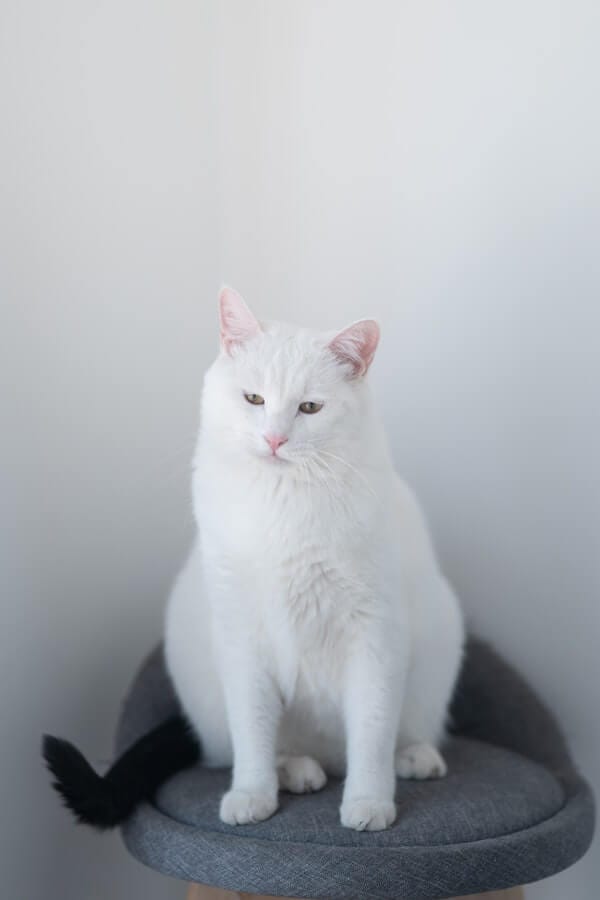
It can be tough being a cat sometimes. Stress is part of life, and cats haven’t been excluded from this.
So if you’re looking for ways to help your stressed-out feline friend, look no further! Here’s how to recognize the signs of stress in your cat and what you can do to help them out.
With a few simple tips, you can make sure your kitty is feeling calm and relaxed. Let’s take a closer look!
What causes stress in cats?
Cats experience stress just like humans do, and they can suffer from it if not dealt with properly.
So what causes stress in cats? It could be anything from a change in routine to an unfamiliar environment or another pet in the home – any kind of disruption to their regular life can cause them anxiety.
Additionally, loud noises, such as fireworks or thunderstorms, can also lead to distress.
Even something as seemingly small as moving furniture around the house can disrupt your cat’s sense of security and set off their stress response.
Furthermore, cats may become anxious when being separated from their owners for too long – this is why it’s important to take your feline friend on trips with you!
And finally, overcrowding can also be a stressor for cats, as they need time alone to relax and have their own space.

How do you know if a cat is stressed?
Stressed cats can be tricky to spot – after all, it’s not like they can directly tell us what’s wrong. However, there are some key signs that can help you detect stress in cats.
1. Hiding:
If your normally outgoing kitty suddenly decides to keep a low profile and spends most of its time hiding away under furniture or within other enclosed spaces, it’s likely a sign of stress.
Cats feel safer when surrounded by walls and this helps them feel more secure if they’re feeling anxious.
2. Eating Habits:
A stressed cat may display changes in their eating habits – they may eat less or even stop eating altogether – which could lead to further health issues if left unaddressed.
3. Grooming:
When cats are feeling under the weather, they often neglect their grooming needs which can lead to an overall disheveled appearance and a dull coat.
If you notice your kitty isn’t as well-groomed as it usually is, it could be an indication that something’s not quite right.
4. Aggressive behavior:
If your cat starts exhibiting more aggressive behaviors such as hissing, growling or swatting at you when you come close, then this could signify that stress levels are high and your pet would benefit from some extra TLC.
5. Vocalization:
Stressed cats may show signs of vocalizing more than usual – whether that’s meowing excessively, yowling or even purring more loudly.
If your kitty’s vocalizations are louder and more frequent than usual, it could be a sign that they’re feeling anxious.
If you think your cat is displaying signs of distress, it’s important to take action soon – after all, our feline friends can’t tell us what’s wrong so we need to be able to recognize the signs in order to give them the best care possible.

How to help a stressed cat
A stressed cat can be a difficult experience, but there are ways you can help your furry friend relax. Here are 7 tips to help your kitty de-stress:
1. Make sure it has a safe, quiet place to retreat from the stressors:
All cats should have a designated “safe zone” in their home that is private and away from any potential stressors such as other animals or loud noises.
It could be just a corner of a room or even better, its own special space.
Fill this area with its favorite toys, bedding, and scratching posts so it feels comfortable and secure there.
2. Provide enriching activities:
Keep your kitty engaged with stimulating activities like interactive playtime, food puzzles, window watching, and hide-and-seek games.
The more stimulating activities you can provide them with, the less time they’ll have to focus on things that stress them out.
3. Keep your cat’s routine consistent:
Cats feel more secure when their daily routines are the same and predictable, so make sure you stick to a regular feeding and grooming schedule for your pet.
This will help them feel in control of their environment and less stressed about it.
4. Offer soothing scents:
The smell of certain essential oils can be calming for cats and might help reduce stress levels in some cats.
Try diffusing lavender, chamomile, or vetiver essential oils in your cat’s safe zone and see if that helps them relax.
5. Don’t scold or punish them:
Scolding or punishing a stressed cat will only add to their anxiety and may lead to aggressive behavior, so don’t use these methods to resolve any issues.
6. Check-in with your vet:
If you have a cat that is constantly stressed out and nothing seems to be working, it may be time to check in with the vet for a professional opinion.
They will be able to provide more specific advice on how to best help your pet relax and lead a happier life.
7. Provide plenty of love and attention:
Last but not least, make sure you’re providing your kitty with lots of love and positive reinforcement so they know they can rely on you during times of distress.
This might include giving treats or extra cuddles or simply talking softly to them–whatever makes them feel most secure and content.
With enough patience, understanding, and affection, you can help your stressed cat relax in no time!

Final Thoughts
At the end of the day, it’s up to us as pet owners to identify when our cats are feeling overwhelmed and help them cope with their stress.
A few simple steps – such as providing a comfortable napping spot, plenty of interactive toys, and regular playtime – can go a long way in making sure your cat stays happy, calm and relaxed.
So give your furry friend some extra love today – they’ll be sure to show you how much they appreciate it!
- 7 Dog Breeds With Webbed Feet And Why Do They Have Them - July 19, 2023
- 10 Best Fish For Small Tanks That Make Perfect Pets - July 18, 2023
- How to Breed Guinea Pigs: A Detailed Guide - July 17, 2023


GIPHY App Key not set. Please check settings